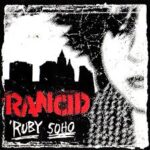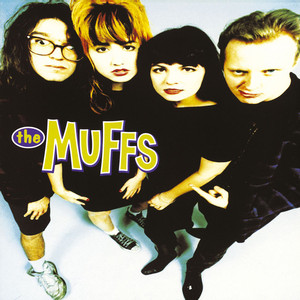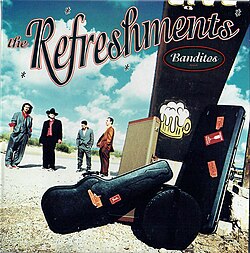 There’s a specific kind of loneliness that only punk rock seems to capture—a restless, aching mix of rebellion and yearning. When Rancid released “Ruby Soho” in 1995 on their landmark album …And Out Come the Wolves, they somehow bottled that feeling in three minutes and fifty-eight seconds. The song didn’t just redefine what a punk anthem could sound like—it brought melody, melancholy, and radio-readiness to a genre that had always prided itself on its rough edges. “Ruby Soho” was a turning point for the East Bay band, bridging the underground ska-punk scene of the early ’90s with a more accessible, emotional, and distinctly American punk sound. It’s a love song, yes, but filtered through the urgency of leaving town before the morning train, through amplifiers and sweaty club walls.
There’s a specific kind of loneliness that only punk rock seems to capture—a restless, aching mix of rebellion and yearning. When Rancid released “Ruby Soho” in 1995 on their landmark album …And Out Come the Wolves, they somehow bottled that feeling in three minutes and fifty-eight seconds. The song didn’t just redefine what a punk anthem could sound like—it brought melody, melancholy, and radio-readiness to a genre that had always prided itself on its rough edges. “Ruby Soho” was a turning point for the East Bay band, bridging the underground ska-punk scene of the early ’90s with a more accessible, emotional, and distinctly American punk sound. It’s a love song, yes, but filtered through the urgency of leaving town before the morning train, through amplifiers and sweaty club walls.
“Ruby Soho” stands as both a goodbye letter and a rallying cry—an ode to impermanence that feels strangely comforting. It’s about the spaces between people, the inevitability of change, and how we keep moving anyway. The song arrived at a moment when punk was starting to break through to mainstream audiences again, after the success of Green Day’s Dookie and The Offspring’s Smash. But while those bands leaned into pop-punk exuberance, Rancid stayed true to their streetwise roots. They brought the sound of ska-infused punk to MTV without diluting its soul.
By the time 1995 rolled around, Rancid—fronted by the gravel-voiced Tim Armstrong and the sharp, melodic bassist Matt Freeman—had already built a cult following. “Ruby Soho” was their crossover moment, a song that connected with people who didn’t necessarily own studded jackets or spend weekends at Gilman Street. Its jangling guitars, ska-inspired rhythm, and bittersweet lyrics made it universal. It’s punk rock you could hum along to in your car, but it never once compromised its grit.
The Sound of Restless Romance
From its opening seconds, “Ruby Soho” immediately feels like a chase scene. The up-tempo drumbeat by Brett Reed sets the pace, a heartbeat in motion, while Lars Frederiksen’s guitar lines shimmer with a mix of punk sharpness and reggae sway. Then comes Armstrong’s unmistakable rasp: “Echoes of reggae comin’ through my bedroom wall…” It’s a line that perfectly captures the duality of the song—a gritty environment softened by music, by love, by memory.
Sonically, “Ruby Soho” is a masterclass in simplicity that never feels simple. The song’s production, handled by Jerry Finn (who would later work with Blink-182 and Green Day), gives Rancid’s raw sound a polished punch. The guitars are crunchy but clear, the bass walks with purpose, and the vocal harmonies—especially Frederiksen’s—add emotional lift. It’s as if The Clash’s London Calling collided with the California punk of Operation Ivy, Armstrong’s earlier band.
“Ruby Soho” isn’t a ballad in any traditional sense, but it carries that emotional resonance. When Armstrong sings, “Destination unknown, Ruby, Ruby, Ruby, Ruby Soho,” it’s both a shout and a sigh. The hook feels defiant and resigned at the same time, like a traveler yelling goodbye at a train that’s already pulling away. It’s this tension—between motion and loss—that gives the song its timeless pull.
The Story Beneath the Song
The lyrics tell a story of two people—perhaps lovers, perhaps just kindred spirits—going their separate ways. Ruby is leaving, chasing her own dreams, and the narrator is left behind, trying to come to terms with it. Armstrong, who has spoken openly about his struggles and transient lifestyle during Rancid’s early years, infused the song with his real sense of impermanence. He’d lived in squats, couch-surfed, and bounced between bands—his life was a series of hellos and goodbyes.
“Destination unknown” isn’t just a lyric; it was a lifestyle for the East Bay punk scene of the ’90s. These were musicians who didn’t have record deals or steady homes, just vans, cheap guitars, and an unshakable sense of purpose. “Ruby Soho” captured that instability and romanticized it, not in a glamorous way, but as a way of life.
Many fans have speculated about who “Ruby” really is. Some claim the name was inspired by Ruby Maddock, a real person who worked closely with the punk scene in San Francisco. Others think it’s symbolic—a stand-in for all the people who’ve had to move on, leaving love and familiarity behind. Armstrong never gave a definitive answer, and maybe that’s what makes the song universal. Everyone has their own Ruby, their own person who had to go.
The Punk That Could Cry
By 1995, punk had split into factions. You had the mainstream success stories—Green Day, The Offspring, Bad Religion—and then the more underground bands keeping the DIY ethic alive. Rancid straddled both worlds. They looked like punks from the alleyways, but their songwriting had evolved far beyond barroom chants. “Ruby Soho” was a turning point where Armstrong and Frederiksen allowed emotion to coexist with rebellion.
The song showed that punk could have a heart without losing its teeth. It wasn’t about rage or politics this time; it was about loss, love, and the inevitability of change. That emotional honesty resonated with audiences who were used to hearing punk bands shout about society but rarely about vulnerability.
“Ruby Soho” hit alternative radio stations hard. MTV picked it up, and suddenly Rancid’s tattooed faces and checkerboard aesthetic were in living rooms across America. Yet, unlike many bands who softened their sound to fit the mainstream, Rancid stayed true. The song’s success came organically—it was simply too good to ignore.
The Lyrics That Linger
The lyrics of “Ruby Soho” are deceptively straightforward, but each line carries weight. “Echoes of reggae comin’ through my bedroom wall / Havin’ a party up next door, but I’m sittin’ here all alone.” That opening image is cinematic—it paints a lonely picture of someone hearing joy just out of reach. The juxtaposition of sound and silence, connection and isolation, is what makes the song so powerful.
Then there’s the refrain, “Destination unknown, Ruby, Ruby, Ruby, Ruby Soho.” The repetition feels like a mantra, something the singer has to tell himself to make peace with the departure. It’s both acceptance and denial, like whispering someone’s name as they fade into the distance.
And that final verse—“Ruby’s heart ain’t beatin’ faster / Ruby’s love ain’t meant to last”—cuts deep. Armstrong’s voice cracks just enough to show that beneath the punk grit, there’s genuine hurt. It’s rare to hear vulnerability expressed so plainly in punk music, especially from a band known for snarling street anthems like “Time Bomb” and “Roots Radicals.” But that’s the beauty of “Ruby Soho”: it humanized Rancid.
Cultural Impact and Enduring Legacy
Nearly thirty years later, “Ruby Soho” still stands as one of the defining songs of 1990s punk. It’s the moment when Rancid proved that punk could evolve without selling out. The song helped cement …And Out Come the Wolves as a cornerstone album for the genre—a record that bridged ska, punk, and rock in a way that appealed to diehards and newcomers alike.
“Ruby Soho” has been covered and referenced countless times, from ska bands to acoustic singer-songwriters. It even inspired a professional wrestler’s stage name—AEW’s Ruby Soho, who entered the ring to the song itself, underscoring its enduring pop-cultural resonance. That crossover appeal is telling: even outside the music world, “Ruby Soho” embodies rebellion, independence, and self-determination.
For Rancid, the song remains a live staple, the kind of anthem that turns crowds into choirs. When the chorus hits, every voice in the room joins in, shouting Ruby’s name like a shared exorcism of lost love and restless spirit. It’s one of those rare songs that grows larger with time, transforming from personal heartbreak into communal catharsis.
Punk That Lasts
What makes “Ruby Soho” endure isn’t just nostalgia or its catchy hook—it’s the way it captures something eternal. Punk, at its core, has always been about truth. Whether that truth comes in the form of social protest or a broken heart doesn’t matter. What matters is that it’s real, that it’s lived.
“Ruby Soho” is real. You can feel every ounce of sincerity in Armstrong’s rasp, every pulse in Freeman’s bassline, every downstroke in Frederiksen’s guitar. It’s a song about transience, and yet it’s become immortal.
There’s something poetic about that—a song about people leaving has never left us. It’s still spinning on playlists, blasting from dive bars, playing at festivals. It still makes people who’ve never even ridden a train feel like they’ve said goodbye to someone at one.
Rancid may have written it from the fringes of the punk scene, but “Ruby Soho” found its way into the mainstream heart of America. It taught a generation that punk could cry, could love, could ache—and still stand tall with its boots and spikes.
The Echo Never Fades
When …And Out Come the Wolves closes with “Ruby Soho,” it doesn’t feel like an ending—it feels like a beginning. Like the sound of a train disappearing into the night, it leaves a trace behind, a memory that lingers long after the music stops.
Tim Armstrong once said that punk saved his life. Listening to “Ruby Soho,” you can hear how that salvation manifests—not as triumph, but as survival. It’s the sound of moving forward even when your heart stays behind.
Almost three decades later, Rancid’s “Ruby Soho” remains a perfect punk song. Not because it’s loud or fast or angry, but because it’s honest. It’s a song about being human, about how sometimes the only thing you can do when love leaves is shout their name into the void and keep on chooglin’.


